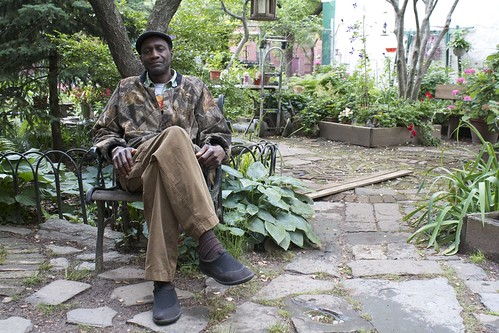A vendor at the flea market at Avenue A and 11th Street is suing a former N.Y.U. Tisch School of the Arts student who disappeared after filming a short documentary about him. The t-shirt designer, Alfa Diallo, is demanding $5,000 in small claims court.
Mr. Diallo said that he agreed to show Matthew Swenson his t-shirt making process after Craig Atkinson, who is also named in the suit, approached his booth last summer and asked if he would participate in his friend’s graduate thesis project.
Mr. Diallo, a relaxed and amicable 60-year-old who was born in Senegal and educated in France, handcrafts the t-shirt designs using a French curve, a tool that creates curly, looped, and elliptical patterns. Mr. Swenson filmed him for two days, said Mr. Diallo – one day at the flea market and another at his apartment on 13th Street and Avenue A.
“They did all this shooting without me being able to see anything,” he said. “Matt said to me, ‘I’ll send you things by e-mail, you should be able to open it and see.’ But I was not able to see it.”
In October, Mr. Swenson did send an e-mail with a link to a file storage site, but the video appeared to be missing.
Technology is not Mr. Diallo’s forte, he admitted. He uses a digital printer, purchased with money he saved as a construction worker, to put his designs on t-shirts, but he enlists his girlfriend to help with other things, like navigating e-mail.
When The Local attempted to access the SendSpace link that Mr. Diallo received last year, a message informed that “the file you requested is not available.” (The site has a 30-day storage limit for free accounts.) Mr. Swenson, who graduated from Tisch in May of 2011, initially said he would comment for this story but did not return subsequent phone calls and e-mails.
“I open my door to you, you were able to do your shooting,” Mr. Diallo vented, shifting into French every now and then for emphasis, “and I’m not able to get a little bit of time from you to show me what you did.”
It’s not uncommon for an N.Y.U. student to ask an East Village artist to be the subject of a class project. Generally, the relationship is symbiotic – the student gets his or her story, and the subject may, at the very least, get some promotion for his work. But some, like Mr. Diallo, might see the relationship as more parasitic.
June Cross, an associate professor at Columbia University Graduate School of Journalism and a documentary producer, said these types of situations can and do happen when generational gaps create misunderstandings between student and subject. “Very often, students who are trying to get someone to agree to be filmed, will promise the earth, the moon and the sky in that first instance,” she said, adding, “If the student finished his film, and the only issue is, the guy wanted to see it and hasn’t seen it, that just sounds more like a nuisance suit to me.”
Without a signed agreement between subject and student, she said, there might be no case. “It’s a ‘he said, she said’ if there’s no release. I would call it a huge miscommunication.”
The matter is set to be heard in small claims court Nov. 1. Mr. Diallo hopes that by pursuing legal ramifications, he can correct what he sees as a transgression against him.
“A house is a temple,” he said. “If somebody opens their door to you, it’s like them showing you their underwear.”
He added, “They taught me a lesson: To be very cautious with people.”




